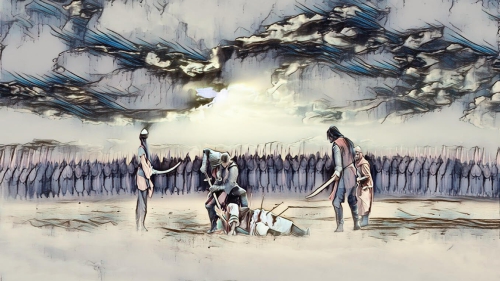Why the Civilization Concept is Flawed

The word “civilization” is the mantra of modernity – and post modernity. It is the measure of all things and the real criterion of humanity’s worth. However, civilization entails more nuances than one can perceive at a first glance.
The concept of civilization is relatively new. It is a socio-cultural construct associated with the emergence of the modernity penchant, whose justification for existence revolved around the notions of scientific discoveries, technological innovations and material progress. The modern man developed a set of benchmarks whereby he wished to frame not only his current accomplishments and all the future undertakings of his, but also the achievements of his predecessors both in not-too-distant and in ancient times.
The modern man became so proud and big-headed insofar as his feats were concerned, and so bigoted, plus judgmental, insofar as the feats of his ancestors were involved. Everything seemed well and good as long as things fitted the modern civilizational patterns; however, no sooner had some subject matters contravened those customary patterns, than the true nature of the modern man and his frame of mind started to surface. Civilizationally doctrinaire, he hastened ex post facto to devalue and spurn whatever proved unconventional and whatever he failed to encompass with his relative knowledge paradigms.
This is the reason why a great many civilizational legacies from the past are yet to be properly “discovered” and appreciated. Locked in his imperceptible and everlastingly imprisoning civilizational cocoon, the modern man is yet to understand the true meaning of history and its ancient socio-cultural traditions as gifts to humankind. Notwithstanding the refinement of a number of aspects of the legacies of many olden nations, and the splendour of their ways of life all together, those have been relegated to the artificially concocted historical eras with equally artificial labels, such as prehistory, ancient history, antiquity, medieval or middle ages, dark ages, etc.
The nations of those epochs have not been regarded as civilized, nor cultured – partly or completely - simply because they lived outside the parameters of modern standards of living. Their civilizational crime was the fact that they were different; they were not “us”. As a result, the modern man continued to live impaired. His subjective thinking and life models guided him only as far as they could go. Hence, how many times he had to rewrite the history books, and how many times more he will have to do the same thing all over again. This disposition of man on the whole prompted Georg Friedrich Hegel (d. 1831), a German philosopher, to declare that the only thing we learn from history is that we learn nothing from it.
From “civilis”, “civis” and “civitas” to “civil law”
The word “civilization” was not used as such until the 18th century. Before that, there were Latin words “civilis”, “civis” and “civitas”, which mean “civil”, “citizen” and “city” respectively. These were the root words for similar derivative words in many European languages. One of them was the English word “civil”, which pertained to a society and public life. Another one was also an English word “civility”, which implied a civic order befitting a citizen, meaning “courtesy”, “politeness”, “affability” and “good manners”.
There was also in Old French a word “civil”, which meant “civil”, albeit relating to civil law. The last example was an effect of a much larger and a much more consequential development in the West. It was a sign of the evolution of the Latinized words in question. (Larry E. Sullivan, The SAGE Glossary of the Social and Behavioural Sciences; www.etymonline.com).
Shedding more light on the matter, in the 6th century, the Byzantine Emperor Justinian I (d. 565) oversaw the codification of the Roman civil law known as the Codex Justinianus (Code of Justinian) or Corpus Juris Civilis. This law, also called “written reason”, was deemed superior to the barbarized compilations that had come into use under the Germanic invaders. Indeed, the law was held superior to any other form of law, in that it carried the combined authority of the pope and the emperor. In addition - and this was crucial for resisting the forms of law beyond the jurisdictions both of the pope and the Byzantine emperor – this Justinian’s Code of civil law carried the authority of an obviously superior culture and intelligence (John Henry Merryman & Rogelio Perez-Perdomo, The Civil Law Tradition).
Within a short time, “Bologna and the other universities of northern Italy became the legal centre of the Western world. Men came from all over Europe to study the law as taught in the Italian universities.” Upon returning to their European countries, the graduates of the Italian universities were quick to establish universities where the same Roman civil law was studied and taught. In this way, the Roman civil law became the basis of law in the whole Europe, and it is still the foundation of civil law in many modern states. Thus, there emerged “a common (Western) body of law and of writing about law, a common legal language, and a common method of teaching and scholarship” (John Henry Merryman & Rogelio Perez-Perdomo, The Civil Law Tradition).
This led to the creation of some new terms: “to civilize”, which meant to undergo the process of adopting and applying the juridical wisdom of civil law; and “civilization”, which connoted the completion of the said process and a new condition that resulted therefrom. Thus, it is said that in 1704 for the first time the word “civilization” was coined in the English language. The word nevertheless signified a law which made a criminal process a civil case.
According to George C. Caffentzis, the earliest “civilization process” in Britain was the result of a conflict between the two branches of law: the common and civil law. The former was the law of England and the latter of the Scottish Lowlands, which was the home of the Scottish Enlightenment, a period in the 18th and early 19th century characterised by a succession of intellectual and scientific achievements that helped the world usher into the First Industrial Revolution as a major period of the modern era. The target of the political and intellectual leaderships (bourgeoisie) of the Scottish Lowlands was to “civilize” England by replacing its common law with its own civil law as a principle of social organization, and also to “civilize” the Scottish Highlanders – who posed a unique threat for the British Empire and “whose military prowess England had learned to fear, after their invasions of England in 1715 and 1745, and their two aborted attempts of 1708 and 1719” – by imposing the same civil law upon them. The Highlanders at that point of time “still lived under the law of the Celtic clan and constituted a threat to the commerce and government of the Scottish Lowlands and to the development of capitalism in Britain” (George C. Caffentzis, On the Scottish Origin of “Civilization”).
Especially with regard to the Scottish Highlanders - who were as much an existential threat as a threat to the enlightenment and progress culture - the objective was wider. They were to be “civilized” as well, but in the sense of bringing them under the uniform civil law, whereby their behaviour could be rendered predictable and so, easily regulated and brought under control. Next, under the pretext of an economic development and overall wellbeing, and within the framework of civil law, the cultivation of self-interest, commerce, the division of labour, the financing of an extensive educational system, the construction of roads, a combined policy of enclosures, transportation, and factory work – all of these were intended to further tame the Highlands and to undermine, once and for all, the Scots’ clannish communalism and martial spirit by driving them out of the Highlands into the capitalistic world. Through these processes, pre-capitalist Scotland ceased to exist, and a new “civilized” (ruled by civil law, restrained and controlled) society took its place.
The remarkable impact of this “civilization process” was described as follows: “There was perhaps never any change of national manners so quick so great and so general, as that which has operated in the Highlands by the last conquest and the subsequent laws. We came hither too late to see what we expected - a people of peculiar appearance and a system of antiquated life. The clans retain little now of their original character: their ferocity of temper is softened, their military ardour is extinguished, their dignity of independence is depressed, their contempt of government subdued, and their reverence for their chiefs abated. Of what they had before the late conquest of their country there remains only their language and their (rural) poverty” (George C. Caffentzis, On the Scottish Origin of “Civilization”).
Civilization as social progress and cultural refinement
It was around the same time that the aggregate developments connected with the post-Renaissance, the Enlightenment, the Age of reason, the Scientific Revolution and the First Industrial Revolution, needed a new expression - or a concept - that would capture the newest phenomena in a most comprehensive manner. Since “everything is law” – as goes the maxim of the School of Law at the Liverpool John Moores University – to the point that “man is born free and everywhere he is in chains (due to laws and social contracts)” – as said by Jean Jacques Rousseau (d. 1778) in his seminal book “The Social Contract” - it seemed appropriate that the legal significations of the terms “civilize” and “civilization” could be expanded to encompass the intellectual transformations and rapid changes the Western man was undergoing. After all, the spans and concerns of the latter were in the same vein as those of the former.
Besides, the objectives of law served at once as agents and guardians of a culture of scientific and technological advancement and of its twin confidant: progress. So much so that law, by virtue of regulating behaviour in both public and private society, is often said to be the backbone of economic well being, and the soul of the state. Law sets standards for acceptable behaviour; it keeps everyone and everything safe; it protects and maintains peace; it gives peace of mind and, in turn, stimulates productivity and invention.
In short, everything was relatable to law, one way or another. The relationships were mutual. By the same token, for christening the novel ethos of the West, the existing terminology in relation to law: “civilize” and “civilization”, proved not just useful, but also meaningfully and complementarily so. As if law and progress were meant for each other, albeit needing some time to find each other and get unified.
Some new shades of meaning were consequently added, such that included the advanced stages of Western inclusive social and cultural development as well as organization, leading to the birth of a new concept: “civilization”. The concept was so comprehensive that it comprised the meanings embedded in its root-words: “city”, “citizen”, “civility”, “civil” and “civil law”, and was so commanding that its conceptualization quickly dwarfed its etymological precursors, yet rendered some of them obsolete, like the words “civilize” and “civilization” in the sense of imposing and applying civil law. For the new concept of civilization, law was a template, city a receptacle, citizens the focus, and civility the quintessence. Civilization was a way of life. Yet, it was life itself. “Civilization” blended the French concern for manners (civility) with the Scottish commitment to Civil Law (George C. Caffentzis, On the Scottish Origin of “Civilization”).
The first person to employ the new catchphrase and concept of civilization in its novel capacity as a civilized condition within the framework of material progress was Victor de Riqueti Marquis de Mirabeau (d. 1789), a French economist. For example, in his book “Philosophie Rurale” (1763) he articulated such words as “civilife” (civilize) and “civilifation” (civilization). The contexts now were different and were in relation to the growth, comfort, convenience and the overall dynamics of the latest standards of living in Western Europe.
The first person to use the concept of civilization in the English language within the concept’s new mantle was Adam Ferguson (d. 1816), a Scottish philosopher and historian of the Scottish Enlightenment. He did so in his book titled “An Essay on the History of Civil Society” which was published in 1767. He said, as for example: “Not only the individual advances from infancy to manhood, but the species itself from rudeness to civilization”; “We are ourselves the supposed standards of politeness and civilization, and where our own features do not appear, we apprehend, that there is nothing which deserves to be known”; “And if our rule in measuring degrees of politeness and civilization is to be taken from hence, or from the advancement of commercial arts, we shall be found to have greatly excelled any of the celebrated nations of antiquity.”
Adam Ferguson clearly spoke about the new meaning of civilization as a total lifestyle, its evolution together with its yardsticks, and about the manners of life which were thought necessary to civilization. He contrasted the greatness of his own people and during his own time with the uncivilizedness of others: those in history and those who were his contemporaries but lived elsewhere and under backward conditions. Adam Ferguson had in mind the highly advanced way of life in Scotland - and by extension in the rest of Western Europe - which was perceived as the measure of all ways of life. It furthermore signified the only absolute worth and influence on account of which other smaller worths and influences were what they were, and all other non-existent worths and influences also were what they were.
Consistent with his theory, Adam Ferguson depicted Arabs and Muslims as wild, violent and in a rude state, that is, in a stage preceding civilization. As such, in their rude and unpolished state, they “fly to the desert for freedom, and in roving bands alarm the frontiers of empire, and strike a terror in the province to which their moving encampments advance.” The prospect of conquest, and everything such entailed, was the main reason for spreading their dominion. In the process, whenever Muslims were possessed of property and of settlement, “they set the example of a lively invention, and superior ingenuity, in the practice of arts, and the study of science.”
However, in spite of this admission of Muslim (Arab) proclivity for artistic and scientific lively invention as well as superior ingenuity, Muslims were not qualified to be civilized, nor were their accomplishments regarded as part of civilization. The reason for that is not far to seek. Muslims’ exploits were patterned in accordance with a different worldview, different sets of values and for different existential objectives. The two civilizational paradigms did not sing from the same song sheet. The molds of history and tradition had been broken. Muslims could not become members of the newly conceived elitist guild, and their biggest “misdeed” was that they were different and what and how they were doing was unfitting. Their fate was sealed, because they could not undo their dispositions.
Certainly, it was not a coincidence that Adam Ferguson was a leading figure in the Scottish Enlightenment, and that the completion of the evolution of the concept of civilization found a fertile ground in the Scottish schools of thought. Adam Ferguson’s above-mentioned book was regarded as ground-breaking and his magnum opus, for which he is remembered the most. Similarly, he is honoured as a forerunner of modern sociology. The book in question is “an intellectual history that traces humanity’s progression from barbarism to social and political refinement (i.e., civilization).” It is likewise worth emphasizing that in his philosophy Adam Ferguson “emphasized society as the wellspring of human morals and actions and, indeed, of the human condition itself” (Britannica).
For that reason man is perceived as the master of his own civilizational destiny. Some communities rise to the task, while others do not. As might be expected, the civilization concept, in part, was a by-product of the nascent biological and social evolutionary thought. The two were entwined. Therefore, it was not by chance that Charles Darwin (d. 1882), an English naturalist, geologist and biologist, was initially educated in Scotland, in the University of Edinburgh, and is considered the crowning point of the Scottish and Midlands Enlightenment. His grandfather, Erasmus Darwin (d. 1802), an English natural philosopher and physician, was a key thinker of the Midlands Enlightenment. Some of his ideas are seen as precursors to the theory of evolution.
One of the scholars that paved the way for Adam Ferguson’s “civilization invention” was David Hume (d. 1776), also a Scottish Enlightenment philosopher and historian, who in his “A Treatise of Human Nature” (1739-40) employed such expressions as “man in his civilized state”, “large and civilized societies” and “numerous and civilized societies cannot subsist without government”. In his “An Enquiry Concerning Human Understanding” David Hume also spoke of “a civilized people” as opposed to “ignorant and barbarous nations”. Whereas his “Political Essays” are replete with references to “civilized age”, “civilized monarchy”, “civilized government”, “civilized nation”, “civilized arts of life”, “civilized world” and “uncivilized condition”.
David Hume did not use the word “civilization”, but his expressions signified that a transition from the preliminary meanings of the terms “civil”, “civility” and “civilize” to the individualized and institutionalized condition of “civilization”, was approaching its completion. Civilization was becoming more of an end, a destination, than a process. “Civilizing” was becoming “civilization”.
Topics: History, Humanity, Modernity, Post Modernity
Views: 976
Related Suggestions

















